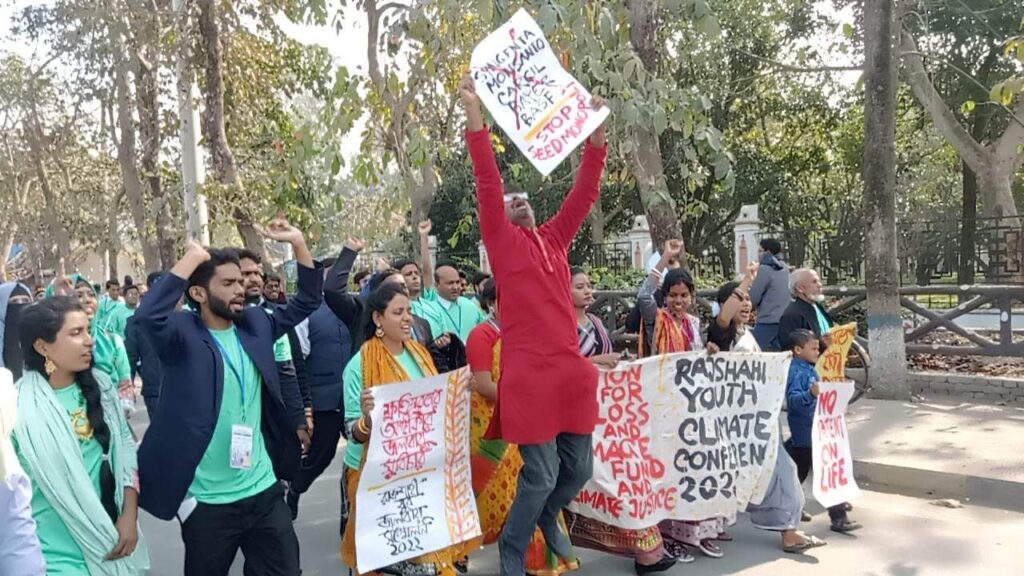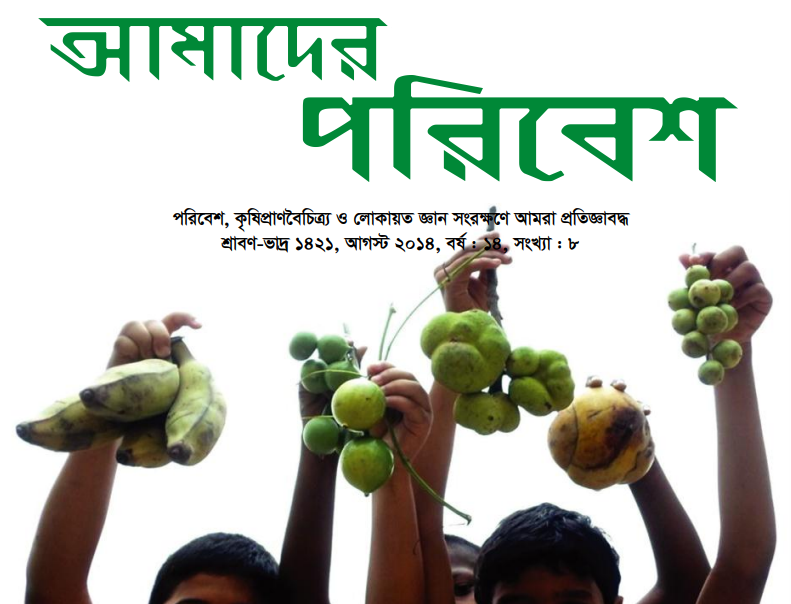Md. Shahidul Islam from Rajshahi
“Rajshahi Climate Conference 2022” was recently demanding climate justice. The two-day climate conference was held recently in Rajshahi District Shilpakala Academy. People and youths from different regions of Bangladesh namely Rajshahi, Netrakona, Manikganj, Satkhira, Chapainawabganj, Bandarban, Khagrachari, Rangamati, Nilphamari, Dhaka, Bagerhat, Sylhet and comprise of different castes, professions, classes, gender participated in the conference. About three hundred young representatives of about 50 youth organizations from Naogaon participated as well. At the same time, teachers, development workers, researchers presented their research papers and various theoretical aspects on the climate crisis during the conference suggesting of sorting out climate hazards.
On the first day of the climate conference, Dr. Abdul Mannan, a brave freedom fighter and freedom fighter commander, inaugurated the conference by hoisting the national flag and honoring the brave freedom fighters. River and environment researcher Mahbub Siddiqui, youth conference convener Sheikh Tasneem Jamal, BARCIK’s director Syed Ali Biswas, author and researcher Pavel Partha, Jahangir Alam and other youth and citizen representatives of different regions were present. Shaikh Tasneem Jamal, convener of the conference and president of Barendra Region Youth Forum, gave a welcome speech in the conference.
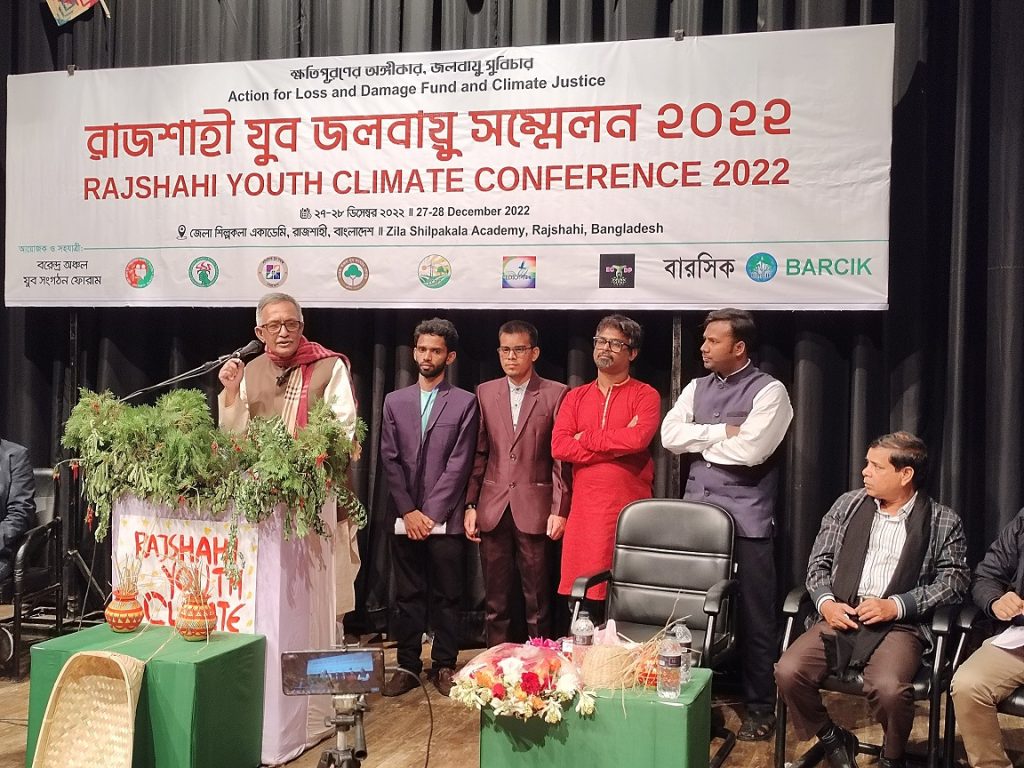
During the conference, the discussants is said, ‘Bangladesh is unique in its regional diversity. Regional impact on climate change is leading to crisis day by day. As temperature rises with drought and lack of rain in the Barind region, the water crisis has become dire. In the coastal areas adjacent to the Bay of Bengal, the ground water level is falling along with the rise in temperature, salinity is increasing due to cyclones and tides. On the other hand, untimely floods and crop losses have increased in the Beel and Haor-beset wetlands. Due to the negative effects of climate change, women face multiple new health crises, as well as increasing health risks among people of different ages and populations.’ They went on saying, ‘The study shows that social violence has increased in Barind region and other regions due to drought and water scarcity. In a word, climate change is creating complex socio-economic problems, which have an impact on the body and mind. Understanding this danger in the regional differences of different regions, climate justice can only be achieved if rich countries fulfill their commitments.
Dr. Rajshahi University’s Institute of Environment took part in the academic and thematic discussion. Golam Mustafa in his presentation titled ‘Climate Change and Our Thoughts’, said, ‘All countries are suffering due to carbon emissions in developed countries. Global temperature is rising. It is also unlikely to stop now. Due to increase in temperature, Himalayan ice will melt, sea level will rise. At the same time the coastal lowlands will be flooded. Agricultural land will become saline. Many people will lose their jobs. We should be prepared on how to give new jobs to all these people and how to rehabilitate them. Training should be given. For this, the compensation should be given to them too.
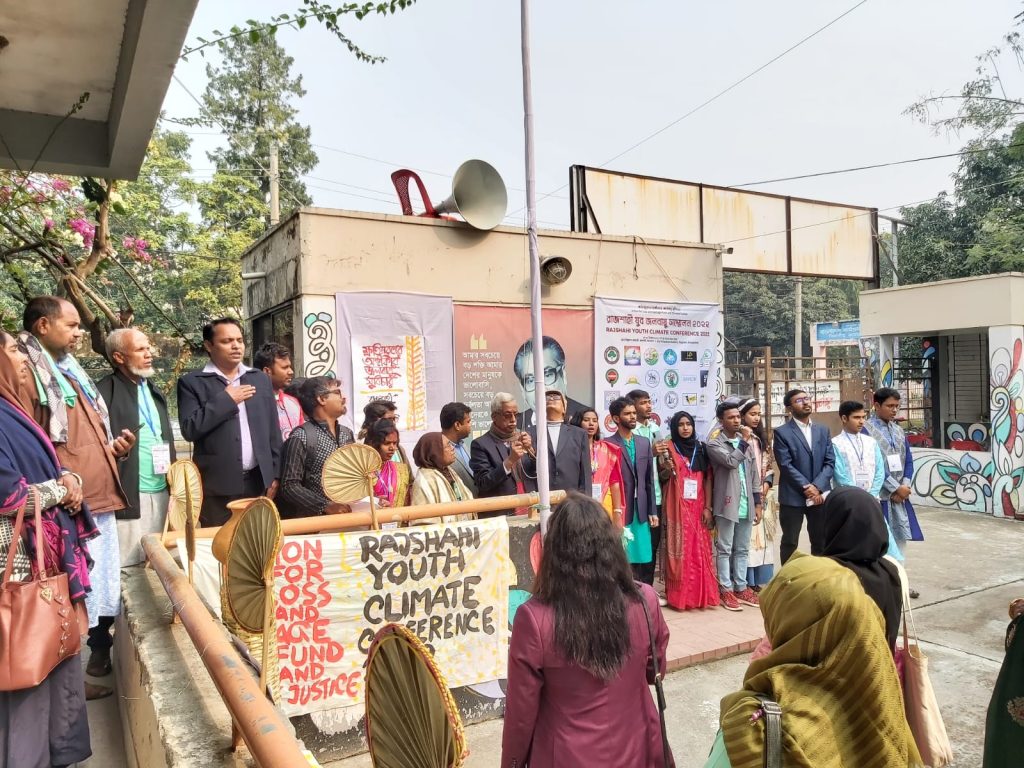
Mahbub Siddiqui, a river and environment researcher, said, ‘The damage we are seeing now, the background has been created a long time ago. The damage that is happening now, we will see the picture of it many years later. This is because we are using the world in a chaotic manner. Although few countries have done this damage to the world, all countries are victims of it. Therefore, compensation should be collected from those who are harming the countries affected by climate change. Youth society should also come forward to speed up this movement.
Rajshahi University Professor of Zoology Department Bidhan Chandra Das, presenting his research paper entitled ‘Climate Change Impact on Biodiversity: A Bangladesh Perspective’, said, ‘Biodiversity is the biggest loss due to climate change, and if this diversity is lost or destroyed, humans will be the biggest victims. Bees and similar insects are declining at an alarming rate. Their role in food production is immense. Therefore, it is necessary to take more effective measures to protect them. Kazi Rabiul Alam, Associate Professor of the Department of Anthropology, Rajshahi University, also participated in the academic discussion. And Abhijit Roy, Associate Professor of the same university, presented the data on his research paper ‘Climate Change: Agricultural Environment of Barind Region in Perspective’. He said, ‘The agroecology and pattern of Barind region is changing due to climate change. Environmental scientist and researcher Dr. Mohammad Zakir Hussain Khan while presenting the paper titled ‘Importance of Environmental Management System for Bangladesh Industry and Climate Change’ said, ‘Industrial factories are destroying the ecosystem and environment in our place, at the same time contributing to climate change. Environment-friendly industrial management should be given more importance.
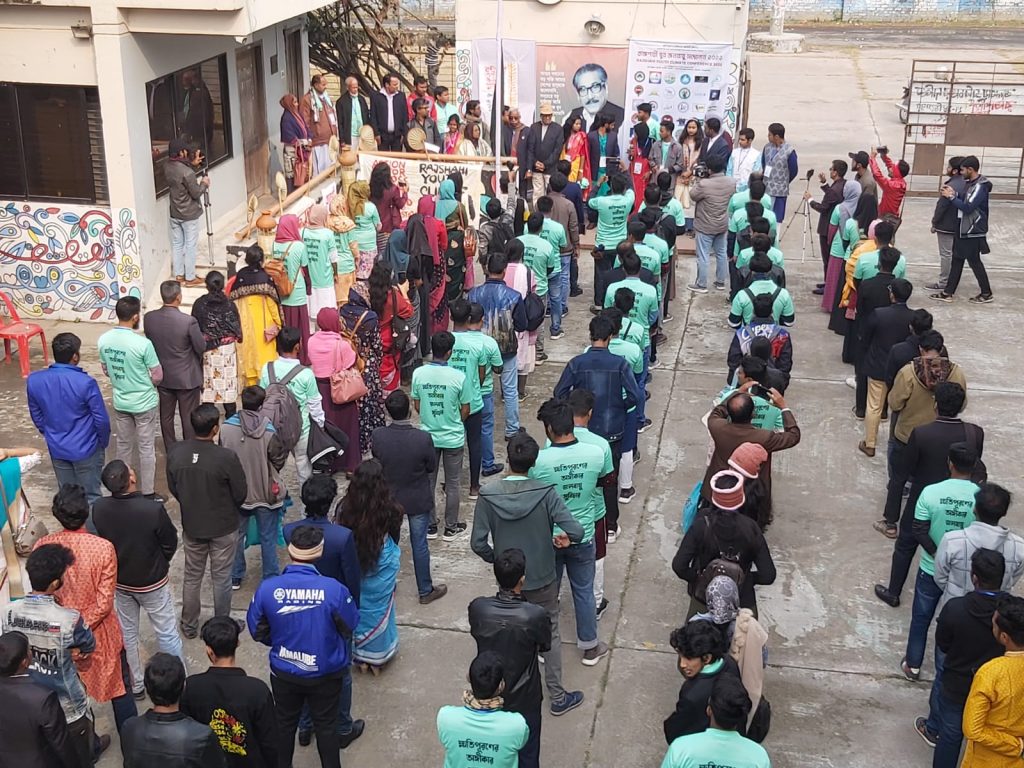
In the academic discussion, Shahidul Islam, researcher and regional coordinator of BARCIK, in his research titled “Climate Change and New Crisis of Barind land” presented the effects of intense heat on the rural life of Barind area and the crisis of agricultural land. In academic discussions, North East University Bangladesh Vice-Chancellor Professor Dr. Elias Uddin Biswas said, ‘The diversity of the Barind region has decreased due to climate change, as well as due to some human-made developments, its diversity has also decreased. If we don’t take steps now to protect and develop the damage to people and biodiversity due to climate change, we will fall into a dire crisis.’ He called for effective action at the government level including writers, researchers and development institutions.
On the second day of the Rajshahi Youth Climate Conference, a climate rally was held at 11 am on the theme of ‘Empowerment and Justice’ to demand the Loss and Damage Fund. About three hundred youth, civil society, journalists, writers, researchers and development workers participated in it. The climate march circumambulated various main roads of the metropolis of Rajshahi and ended at the District Shilpakala Academy. After that, people from different regions, professions, gender, caste, age and social diversity and rural people from the different part of the country in the cultural event presented with songs, speeches, discussions, performances, exhibitions, etc. However, based on the discussion and research papers, the diverse cultural performances and climate of the Bengali and tribal communities of the various agrarian regions of the country are declared. Simultaneously the Youth Climate Award 2022 was announced.
Rajshahi Youth Climate Declaration 2022 was read out based on two days of Rajshahi Youth Climate Conference with the participation of people from all regions to take effective steps towards climate justice and their demands. Honorable Member of Parliament of People’s Republic of Bangladesh Fazle Hossain Badsa (Member of Parliament-Rajshahi-02) was present as the chief guest during the declaration. The Rajshahi Youth Climate declaration reads the following issues:
Rajshahi Youth Climate Declaration 2022
- Global temperature cannot be allowed to rise by more than 1.5 degrees. The temperature should be kept within 1.5 degrees.
- Countries responsible for climate change must reduce carbon emissions according to the climate agreement. Each country should implement it by clarifying its domestic contribution.
- According to the commitments of the climate agreement, the countries responsible for climate change must pay adequate compensation to the international climate fund. This fund should be spent unconditionally for countries affected by climate change, including Bangladesh. All management of the Climate Fund should be transparent, decentralized and accountable.
- Adaptation practices and indigenous knowledge of local communities should be given priority consideration in dealing with the impacts of climate change. This adaptation needs to be recognized and necessary measures and policies should be adopted.
- Not only adaptation, but also global mitigation initiatives must be directly visible. In this case things like carbon-trading cannot be encouraged.
- All over the world, including Bangladesh, agricultural land, forests, rivers and aquifers, soil, including biodiversity and nature must be protected. Climate change impacts need to be assessed in order to establish commitments to the International Biodiversity Convention.
- An international ‘Erosion and Loss Fund’ to address the damage caused to rural and urban areas by climate change, particularly extreme heat, drought, floods, landslides, salinity, cold flows, lightning, hail, cyclones and river bursts should be established. It should be implemented very quickly.
- Changes in occupations and migration and displacement due to climate change need to be deeply understood. In this case, new migration places should be secured for climate-refugees due to climate and dignified employment should be ensured for these people. In this case, civil facilities including housing should be ensured for urban poor and slum dwellers living in urban areas as climate refugees.
- Rural culture and arts, which are endangered due to climate change, should be supported in development. In this case, plans and funds should be allocated for the practice and development of all rural arts and culture across the country.
- Youth participation must be ensured in all planning and activities to deal with climate change. Youth in agriculture and climate protection must be voiced by youth. Special scholarships, fellowships and productive creative work at different levels and levels (rural and urban) should be added for youth to research and work on climate change. To combat climate change and organize various activities through the youth should be supported to act.
- The media should give more publicity and exposure to the exemplary actions of rural communities working to combat climate change. Climate-friendly media should be developed to promote climate change and environmental protection through youth.
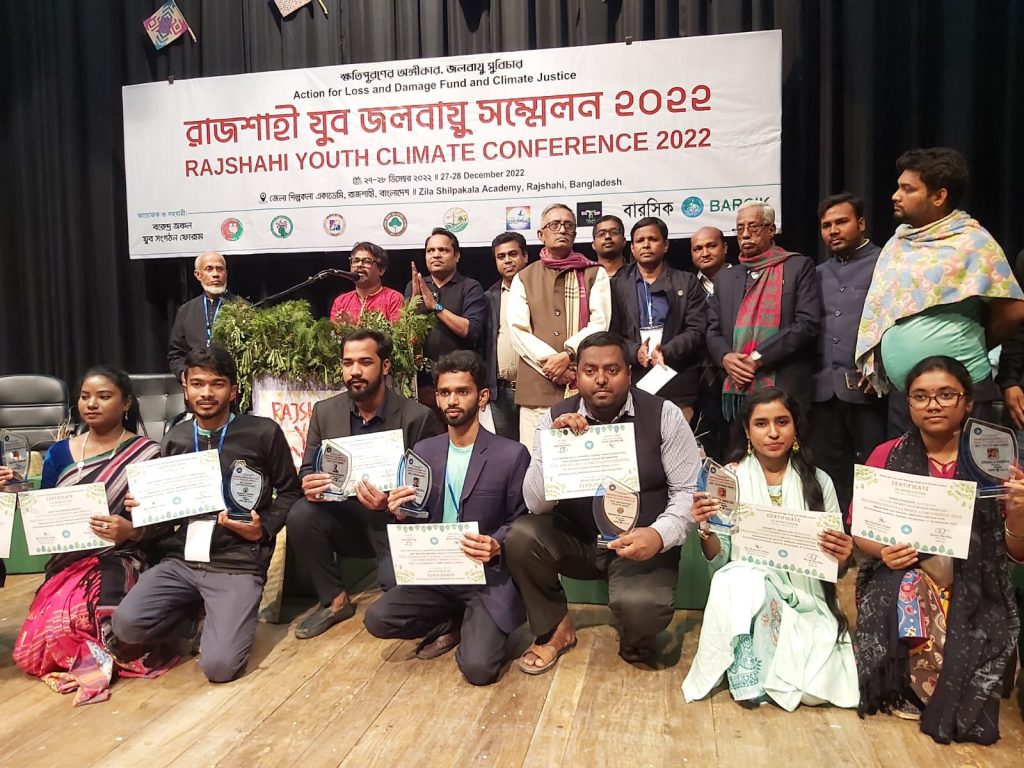
In the climate declaration, the youth also said, ‘We are young youth society. We understand that this world is being polluted and dangerous every day by some of the rich and powerful people of the world. We cannot leave the responsibility of this world to some people. This world is ours, and only one planet is ours. It is our responsibility to save it. We don’t want to hear any more false promises and bogus solutions. We have heard many such things over the years. We do not want to hear the same words and beautiful promises from world leaders over and over again through conferences and dialogues. We understand that they have no ability to change the society, they just want to kill the world because of profit and greed. They took away our childhood. We have no playgrounds, our rivers are polluted, our food is plastic, our forests are depleted and our air is polluted. The luxury of developed and rich countries are responsible for this. We want this situation to change.’
Translated by Silvanus Lamin

